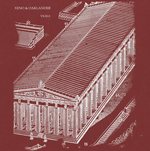|
|
 |
Dusted Reviews
Artist: Xeno and Oaklander Album: Vigils Label: Wierd Review date: Feb. 7, 2011 |

|
|
|
 |
The music of Brooklyn synth duo Xeno and Oaklander can be vexingly hard to describe because it’s kind of always been there. Sean McBride and Liz Wendelbo work with a sound that emerged in the late 1970s and early ‘80s, but only achieved genre status in the 2000s. You could probably guess this type of music existed given the variables of the time (punk, affordable synths and drum machines, Cold War paranoia) even if you haven’t heard the compilations that helped solidify the idea of minimal wave — which takes its name from Veronica Vasicka’s label and radio show — like So Young but So Cold or the more recent Minimal Wave Tapes, Vol. 1. Xeno and Oaklander’s music is nostalgic for O.G. minimal wave’s raw analog sounds and stark sense of alienation. At worst, this leads to historical reenactment, but X&O avoid that pitfall by dealing with more abstract (and, in a way, recent) notions like community and craft. The singing may be affected and the vibe icy, but this band is for real.
Naturally, McBride and Wendelbo’s synths and effects are exclusively analog and they insist on recording everything live in one take, but what sets their longing for the past apart from the conceptual bête noire of chillwave is that they have ideas about what to be nostalgic for. They have ideals—a particular sound they’re aspiring to, but also a critique of digital isolation launched from a bank of analog machines. Their particular working methods are in the service of concise and clearly articulated songs that let ambitious melodies and severe/morose vocals unfurl over nervous pulses. The music is basically dark synthpop, but there are so many textures and melodies that it sometimes makes for a psychedelic listening experience.
They nailed this sound on their excellent debut album, 2009’s Sentinelle, which comes across as a crystallization of all the varied activity around minimal wave. Now Wierd is reissuing the duo’s first release, the 2006 EP Vigils. These two releases sport similar cover art — rad images of classical architecture in inverted color schemes that drive home the theme of excavating the past — and sound quite similar. Predictable differences: the EP isn’t as well recorded, the songs aren’t as dynamic, and it has less emotional range. Sentinelle had some dull moments, but it always recovered because it ultimately felt like a stand-alone experience. It was worth sitting through the weaker points because something massive like “Toho Picture” would come on and in a moment X&O would be back in their pitch-perfect mystical realm of anal bedroom keyboardery. Vigils breaks the spell without expanding the listener’s notion of the band.
If you judge the EP by its standouts — ”Züruck” and the title track come to mind — it can be as good as Sentinelle. But too many of the tracks, like “Non Senti,” which features Wendelbo singing in Italian as she escapes from a mausoleum or something, are kind of a grind coming from the same band that can now write something as layered as “Preuss.” These two have leveled up their songwriting chops and stayed true to the amateur spirit of minimal wave in the three years between Vigils and Sentinelle, but it’s hard to have strong feelings about this EP out of sequence.
Xeno and Oaklander has developed in a linear way because McBride and Weldelbo knew what they were trying to do. When an interviewer asked the band members which musician drove them to start their own project, McBride replied, “It’s a particular methodology in music that inspired me, not a singular band.” Vigils introduced listeners to that methodology and Sentinelle brought it to a certain kind of perfection. At this point, there isn’t anything more to say.
By Brandon Bussolini
|







